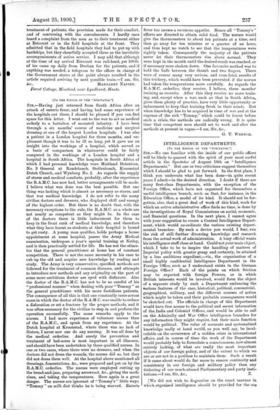[TO THE EDITOR OP THE "SPECTATOR."]
Sin,—Having just returned from South Africa after an attack of enteric fever, and having had some experience of the hospitals out there, I should be pleased if you can find space for this letter. I went out to the war to act as medical orderly to a battalion of mounted infantry. I have been through a six months' course of medicine and surgical dressing at one of the largest London hospitals. I was also a patient in a London hospital for three months, and un- pleasant though it was to be ill so long, yet it gave me an insight into the workings of a hospital, which served as a basis of comparison in whatsoever could be fairly compared in the workings of a London hospital and a hospital in South Africa. The hospitals in South Africa of which I had personal knowledge were Maitland Detention, No. 3 General at Rondebosch, Stellenbosch, Kroonstad Dutch Church, and Wynberg No. 2. As regards the supply of stores and medical comforts, probably, after the experience the R.A.M.C. has now had, better arrangements will be made. I believe what was done was the best possible. But one thing was lacking which is almost as necessary as stores, and that was medical knowledge. I do not refer to the many civilian doctors and dressers, who displayed skill and energy of the highest order. But there is no doubt that, with the necessary exceptions to the rule, the R.A.M.C. as a whole are not nearly as competent as they might be. In the case of the doctors there is little inducement for them to keep in the front rank of medical knowledge, and therefore what they have learnt as students at their hospital is bound to get rusty. A young man qualifies, holds perhaps a house appointment at some hospital, passes the Army Medical examination, undergoes a year's special training at Netley, and is then practically settled for life. He has not the stimu- lus that the general practitioner at home has of constant competition. There is not the same necessity in his case to rub up the old and acquire new knowledge by reading and study. The Army is very conservative, specified methods are followed for the treatment of common diseases, and attempts to introduce new methods and any originality on the part of some more ambitious doctor are eyed with disfavour. Also the doctor of the R.A.M.C. has not to be so careful of his " professional manner " when dealing with poor " Tommy " as the general practitioner with his more fastidious patients. The consequence of all this is that one constantly came across cases in which the doctor of the R.A.M.C. was unable to reduce a dislocation or set a fracture by the proper methods, and it was often necessary for the civilian to step in and perform the operation successfully. The same remarks apply to the nurses. I had more experience of volunteer nurses than of the R.A.M.C., and speak from my experience. At the Dutch hospital at Kroonstad, where there was no lack of Sisters, I never saw one do any nursing. It was all done by the medical orderlies. And surely the prevention and treatment of bed-sores is most important in all illnesses, and should have been undertaken by these qualified nurses. In one or two cases, where there were no dressers, and when the doctors did not dress the wounds, the nurses did so, but they did not dress them well. At the hospital above mentioned all dressings, fomentations, &c., were prepared and put on by the R.A.M.C. orderlies. The nurses were employed cutting up the bread-and-jam, preparing arrowroot, &c., giving the medi- cines, and taking the temperatures. Here again is a great danger. The nurses are ignorant of " Tommy's " little ways. "Tommy" on milk diet thinks he is being starved. Enteric fever too causes a ravenous appetite. Hence all " Tommy's " efforts are directed to obtain solid food. The nurses would give the thermometers to about ten patients at a time, and then go away for ten minutes or a quarter of an hour, and thus kept no watch to see that the temperatures were rightly taken. Consequently the majority of the patients never let their thermometers rise above normal. They were kept in the mouth until the desired result wa,e reached, or if necessary were shaken down. One favourite method was to hold the bulb between the thumb and two fingers. There were of course many very serious, and even fatal, results of this trickery, which would have been prevented if the nurses had taken the temperatures more carefully. As regards the R.A.M.C. orderlies, they receive, I believe, three months' training as recruits. After this they receive no more train- ing, and, except when a war, such as that in South Africa, gives them plenty of practice, have very little opportunity or inducement to keep that training fresh in their minds. But when knowledge has to be acquired in time of war and at the expense of the sick " Tommy," which could be learnt before such a crisis, the methods are radically wrong. It is quite time that competent men should set to work and alter the methods at present in vogue.—I am, Sir, &c., G. T. WRENCH.


































 Previous page
Previous page